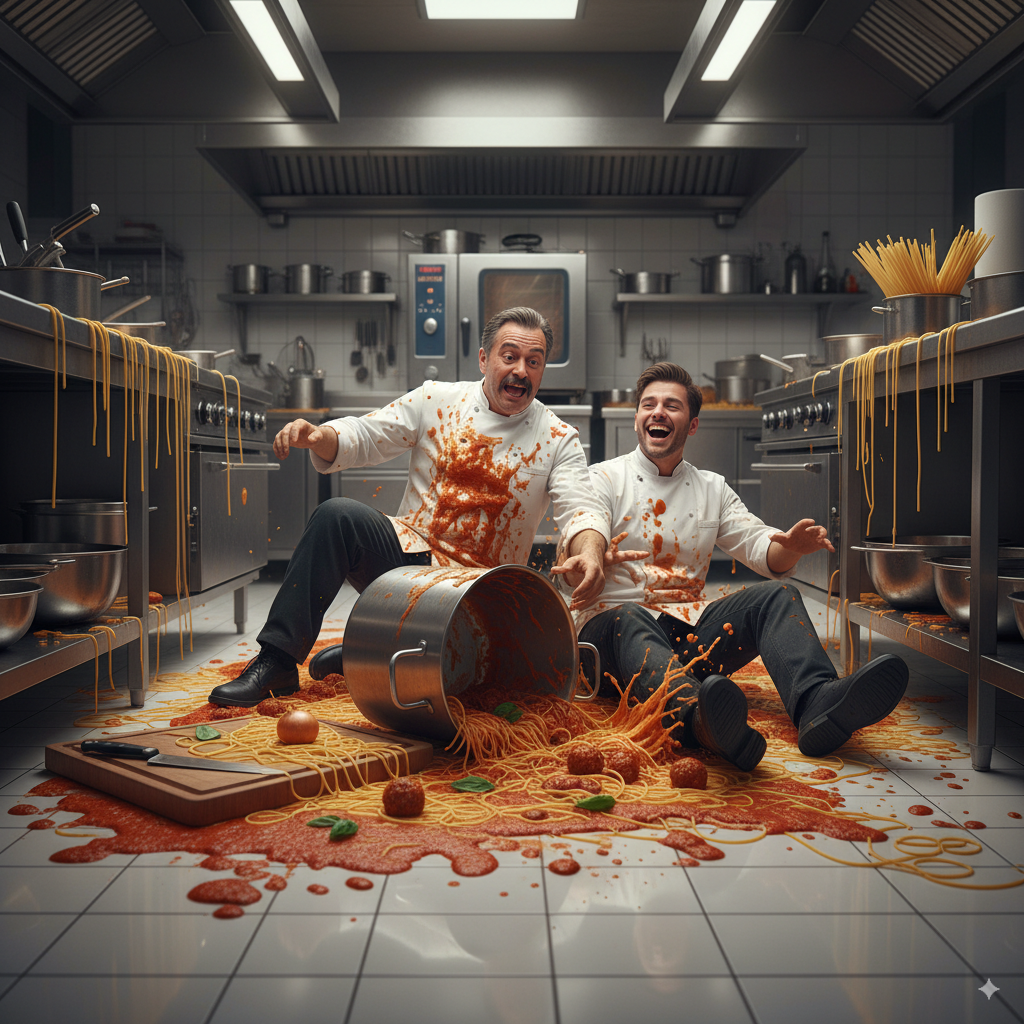The aroma of garlic and oregano usually filled Chef Antoine’s kitchen with a comforting embrace, a prelude to the culinary masterpieces that emerged from his practiced hands. But today, a different scent hung heavy in the air, a premonition of imminent chaos: the metallic tang of an overflowing pot and the faint, unsettling whisper of impending doom.
Antoine, a man whose mustache twitched with the precision of a metronome as he chopped and stirred, was in the midst of preparing his signature dish, the “Symphony of Strands.” It was a spaghetti dish so delicate, so flavorful, that patrons often wept tears of joy into their napkins. Today, however, those tears would likely be born of an entirely different emotion.
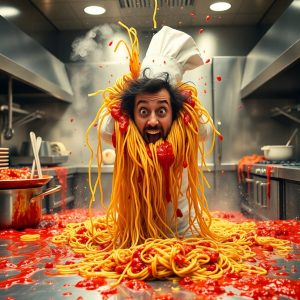
He had miscalculated. Not by a pinch of salt or a dash of pepper, but by a catastrophic margin. The industrial-sized pot of al dente spaghetti, glistening like golden serpents, was simply too much. As he strained to lift it from the burner, a bead of sweat trickled down his temple, momentarily blurring his vision. A single, treacherous strand of spaghetti, like a defiant scout, dangled over the edge of the pot, a harbinger of the pasta-pocalypse to come.
With a grunt that was more a plea than an effort, Antoine heaved. The pot, top-heavy and protesting, swayed precariously. For a fleeting moment, time seemed to slow. He saw his entire culinary career flash before his eyes – the Michelin stars, the glowing reviews, the adoring public. Then, with a sound akin to a thousand tiny whips cracking, the pot tilted.
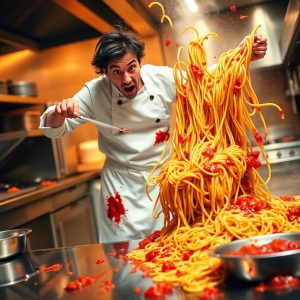
What followed was not merely a spill; it was an eruption. A tidal wave of spaghetti, glistening with a rich, ruby-red marinara sauce, cascaded over the edge of the counter. It hit the pristine white tiles of the kitchen floor with a splat that echoed like a surrender.
The initial impact was followed by a viscous, slithering spread. The spaghetti, liberated from its metallic confines, snaked across the floor, forming an ever-expanding, saucy lake. Antoine, caught in the initial splash, found himself standing in a rapidly deepening pool of his own culinary creation. His pristine white chef’s jacket, usually a beacon of professionalism, was now adorned with abstract expressionist streaks of tomato and pasta.
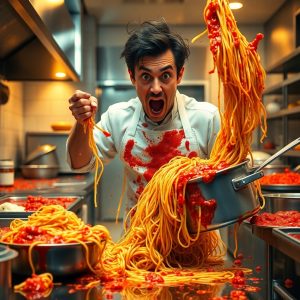
He stared, aghast, at the disaster. The kitchen, once a bastion of order and precision, had been transformed into a grotesque, edible swamp. The usually immaculate stainless-steel surfaces were now streaked with crimson, and stray meatballs, like errant planets, dotted the landscape of noodles.
Then, the true horror began. The floor, once a firm foundation, became a treacherous, gelatinous trap. Antoine, still rooted to his spot in disbelief, took a tentative step. His polished clogs, usually so reliable, found no purchase. His feet shot out from under him, and with a yelp that was more dignified than it had any right to be, he landed with a soft, squishy thud in a pile of linguine.
He scrambled to get up, but the spaghetti, like a thousand tiny greased eels, offered no grip. Every attempt to gain traction resulted in a further, more undignified slide. He was an uncoordinated figure skater on a rink of pasta.
Just then, his sous chef, Pierre, entered the kitchen, whistling a jaunty tune. Pierre, a stickler for cleanliness, stopped dead in his tracks. His jaw dropped, and the whistle died in his throat, replaced by a choked gasp.
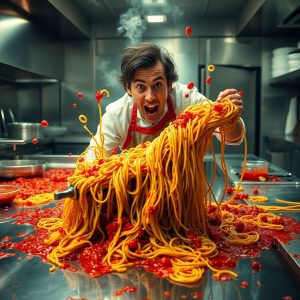
“Chef?” Pierre’s voice was a whisper of bewildered horror. “Mon Dieu! What… what has happened?”
Antoine, still flailing amidst the noodles, managed to extricate a hand, which he then, unintentionally, wiped across his brow, leaving a streak of marinara that made him look like a particularly distraught clown.
“The… the spaghetti,” Antoine stammered, his dignity rapidly eroding with each futile scramble. “It… it got away from me.”
Pierre, usually so stoic, let out a high-pitched giggle that quickly escalated into full-blown laughter. It was the kind of hysterical laughter that can only be triggered by witnessing a truly epic and utterly ridiculous disaster. He pointed a trembling finger at Antoine, who was now attempting to use a particularly long strand of spaghetti as a makeshift lasso to pull himself up.
The laughter, however, proved to be contagious, or perhaps the sheer absurdity of the situation simply overwhelmed Pierre. As he took a step further into the kitchen, his own feet found the treacherous surface. With a cartoonish “whoop!” he too went down, landing with a splash that sent a spray of sauce into the air.
Now, both chefs were sprawled in the spaghetti-filled kitchen, two helpless figures in a sea of noodles. Antoine, seeing Pierre’s equally undignified state, found a strange sense of camaraderie in their shared predicament. He let out a grudging chuckle, which then turned into a full-blown guffaw.
The Great Spaghetti Incident became a legend in the culinary world, whispered with a mix of horror and amusement. It was a cautionary tale of miscalculation, of the unpredictable nature of boiling pasta, and of the sheer, unadulterated chaos that can erupt when a chef, even a master, loses his grip.
As for the “Symphony of Strands,” it was, predictably, canceled that night. The patrons, initially disappointed, found themselves captivated by the rumors of the pasta-pocalypse. And somewhere, amidst the clean-up, Antoine and Pierre, still a little sticky, began to concoct a new dish, a dish born from the ashes (or rather, the sauce) of their greatest culinary blunder: “The Redemption Rigatoni,” a dish rumored to be served with a side of extra napkins and a healthy dose of self-deprecating humor.
But for now, the kitchen remained a scene of utter, saucy devastation, a monument to the day the spaghetti fought back.
